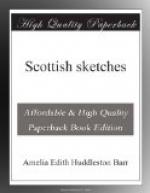And when his own sons were grown up to youths, one bound for the sea and the other for Marischal College, Aberdeen, he took them aside and told them this story, adding,
“An’ know this, my lads: the shame an’ the sorrow cam a’ o’ ane thing—I made light o’ my mother’s counsel, an’ thought I could do what nane hae ever done, gather mysel’ with the deil’s journeymen, an’ yet escape the wages o’ sin. Lads! lads! there’s nae half-way house atween right and wrang; know that.”
“But, my father,” said Hamish, the younger of the two, “thou did at the last obey thy mother.”
“Ay, ay, Hamish; but mak up thy mind to this: it isna enough that a man rins a gude race; he maun also start at the right time. This is what I say to thee, Hamish, an’ to thee, Donald: fear God, an’ ne’er lightly heed a gude mother’s advice. It’s weel wi’ the lads that carry a mother’s blessing through the warld wi’ them.”
Lile Davie.
LILE DAVIE.
In Yorkshire and Lancashire the word “lile” means “little,” but in the Cumberland dales it has a far wider and nobler definition. There it is a term of honor, of endearment, of trust, and of approbation. David Denton won the pleasant little prefix before he was ten years old. When he saved little Willy Sabay out of the cold waters of Thirlmere, the villagers dubbed him “Lile Davie.” When he took a flogging to spare the crippled lad of Farmer Grimsby, men and women said proudly, “He were a lile lad;” and when he gave up his rare half-holiday to help the widow Gates glean, they had still no higher word of praise than “kind lile Davie.”
However, it often happens that a prophet has no honor among his own people, and David was the black sheep of the miserly household of Denton Farm. It consisted of old Christopher Denton, his three sons, Matthew, Sam, and David, and his daughter Jennie. They had the reputation of being “people well-to-do,” but they were not liked among the Cumberland “states-men,” who had small sympathy for their niggardly hospitality and petty deeds of injustice.
One night in early autumn Christopher was sitting at the great black oak table counting over the proceeds of the Kendal market, and Matt and Sam looked greedily on. There was some dispute about the wool and the number of sheep, and Matt said angrily, “There’s summat got to be done about Davie. He’s just a clish-ma-saunter, lying among the ling wi’ a book in his hand the lee-long day. It is just miff-maff and nonsense letting him go any longer to the schoolmaster. I am fair jagged out wi’ his ways.”
“That’s so,” said Sam.
“Then why don’t you gie the lad a licking, and make him mind the sheep better? I saw him last Saturday playing sogers down at Thirlston with a score or more of idle lads like himsel’.” The old man spoke irritably, and looked round for the culprit. “I’ll lay thee a penny he’s at the same game now. Gie him a licking when he comes in, son Matt.”




